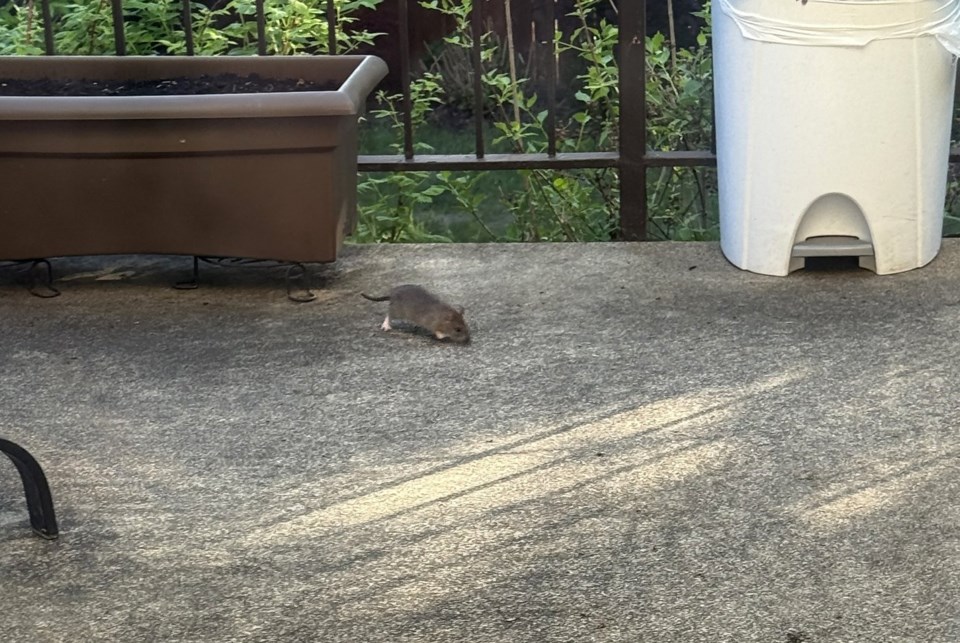MONTREAL — The rats took over James Klein’s backyard this spring.
He’d never had a rat problem in the more than two decades he’s lived in Montreal’s Snowdon neighbourhood. But now, when he watches TV in his family room, he sees them out of the corner of his eye, scurrying around outside the glass door leading onto his back deck.
“There’s no way to even describe what it’s like,” he said.
Klein doesn’t know why the rats suddenly appeared. He thinks they may have been displaced when the city dug up some of the pipes in his neighbourhood earlier this year.
But whatever the reason, the upshot is that he hasn’t had a meal outside all summer. “One night, there were a whole bunch of them that were having a party on my back deck. And literally, they're running back and forth and chasing each other,” he said. “It's just brutal.”
Klein isn’t the only one raising the alarm about Montreal’s rat population. The number of rat-related calls to the city has risen sharply in recent years, despite a two-year-old pledge by city council to come up with a plan to control the rodents.
Data obtained by The Canadian Press show there were more than 1,700 calls to Montreal’s 311 phone line in 2024 concerning rats, up from just over 1,000 calls two years earlier. In some of the city’s 19 boroughs, the number of calls more than doubled in that time.
The city says it’s taking the situation seriously. It says the boroughs are attempting to control the rodents through inspections or the deployment of exterminators.
But critics say the municipal government is doing little to fix what they see as a growing problem, leaving residents on their own to deal with an intractable situation.
“In our borough council meetings, we've had significantly more residents bringing up the presence of rats in residential areas that they normally would have never seen them in,” said Stephanie Valenzuela, an opposition city councillor in Klein’s borough of Côte-des-Neiges–Notre-Dame-de-Grâce. “It’s impacting their daily lives, it's impacting their businesses, and it's quite difficult for the quality of life of everyone.”
In her borough, rat-related calls to the city more than tripled between 2022 and 2024.
The city, which provided the numbers in response to an access-to-information request, said calls include complaints, comments and requests for information about rats.
The two boroughs that reported the most calls last year are Ville-Marie, which comprises all of downtown Montreal, and the northern borough of Villeray–Saint-Michel–Parc-Extension. Between 2022 and 2024, the number of rat-related calls more than doubled in both boroughs.
Valenzuela said the municipal government has failed to act on an opposition motion, passed unanimously in 2023, which called for the creation of a rat-control plan.
The plan would have included measures to manage rats during construction work in the city’s sewers, and to replace open garbage bins with closed ones in public places.
“Unfortunately, two years later none of these measures have been implemented in any part of the city,” said Valenzuela, who has been encouraging residents to call 311 and complain.
A spokesperson for the city said Montreal already has rules intended to keep sewers sealed during construction. “That being said, maintaining a clean environment remains the best way to limit the presence of rats,” said Hugo Bourgoin, adding that each borough is responsible for managing its own rat population.
Klein said one of his neighbours started a petition about the rodents last fall, but little came of it. At a borough council meeting in May, in response to a question about rats in Klein’s neighbourhood, an official answered that “the city's capacity for intervention remains rather limited,” as traps and poison cannot be used in public places.
“To have the city tell us, essentially, ‘There's nothing we can do and you have to live with it,’ is totally unacceptable,” Klein said.
Hélène Bouchard, president of two pest management companies in Montreal, said it’s hard to know whether the number of rats in the city is actually on the rise, or whether they’ve simply become more visible.
She said the closure of restaurants and other businesses during the pandemic pushed rats to venture further into residential areas in search of food, and those habits may have stuck.
“They have a good memory,” she said. “They will always take the same path to find their food sources.”
She said the proliferation of community gardens may also attract the rodents, while sewer work can displace rat colonies.
Another problem is that people often put their garbage out the night before it’s scheduled to be picked up, Bouchard said. “That’s an open buffet for the rats.”
Garbage collection has become a contentious issue in Montreal in recent years, as the city has promoted composting and reduced the frequency of trash pickup in some neighbourhoods.
Montreal Mayor Valérie Plante’s administration is aiming to move the whole city to biweekly garbage collection by 2029. But Valenzuela said the city hasn’t done enough to ensure residents are composting their food waste.
“A lot of things that could be composted and picked up every week are being thrown in the trash,” she said. “And that has been a cause for why there has been an increase in garbage laying out there and smelling and attracting rodents.”
Klein, however, said he hasn’t left anything out for the rats to eat. He said he’s “disgusted” every time he looks outside, but feels powerless to solve the problem.
“There's nothing that we as taxpayers can actually do,” he said. “It's really just the city that has to step up.”
This report by The Canadian Press was first published Aug. 4, 2025.
Maura Forrest, The Canadian Press




